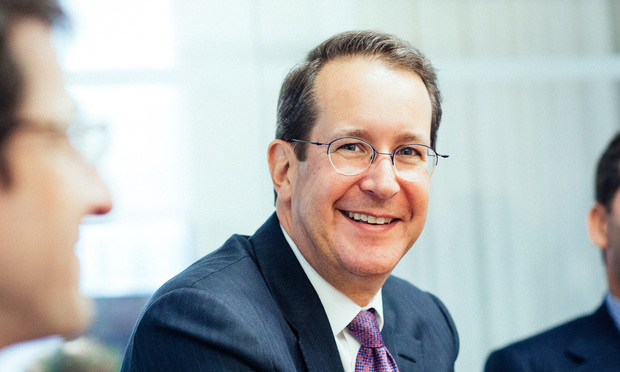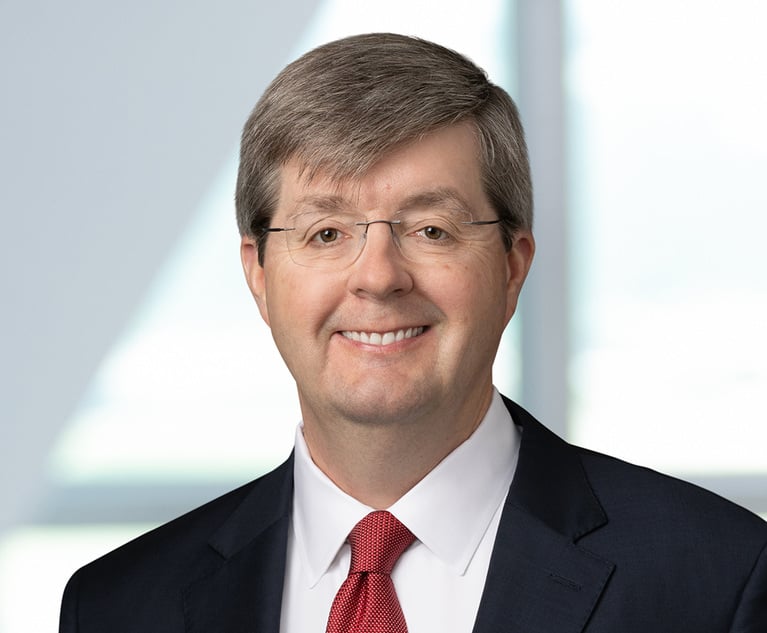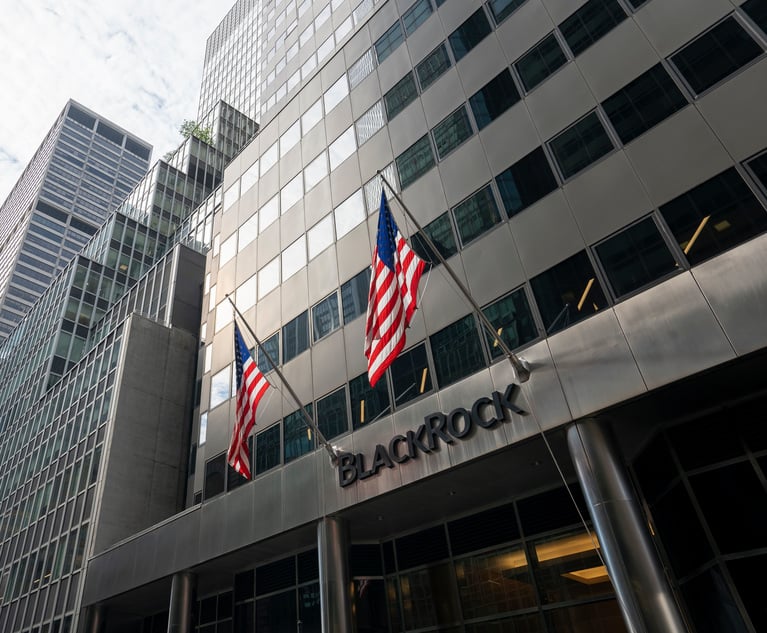Burford Sells $100M Stake in Argentine Oil Case After SCOTUS Nixes Appeal
The emergence of a secondary market for funded claims speaks to the "continuing maturity" of litigation finance, said Burford CEO Christopher Bogart.
June 24, 2019 at 03:19 PM
4 minute read
 Chris Bogart, CEO, Burford Capital. (Courtesy photo)
Chris Bogart, CEO, Burford Capital. (Courtesy photo)
Third-party litigation funder Burford Capital took advantage of favorable news from the U.S. Supreme Court on Monday to announce the sale of a 10% share in one of its investments for $100 million.
This is not the first time that Burford has offloaded a stake in the case, Argentine Republic v. Petersen Energia Inversora S.A.U., which involves a bankrupt investor in one-time state-owned petroleum company YPF suing Argentina and the company over its 2012 expropriation. But now that the Supreme Court has elected not to hear an appeal over whether U.S. courts had jurisdiction over the matter, the value of the case is growing.
Burford first sold a 10% share in the Petersen case in a sale that closed in December 2016 and March 2017 for $40 million, and the latest sale reflects a 150% increase in value.
Burford CEO Christopher Bogart said that he was not aware of any of Burford's peers in the litigation funding space taking advantage of a secondary market for claims.
“It's something that we've been talking about developing for the last several years,” he said. “The funding challenge we have is that capital flows in litigation finance are difficult to predict.”
Specifically, the uncertain timing of the resolution of cases—via settlements or rulings—stands in the way of Burford and other third-party funders to take full advantage of their capital.
As a result of the deal announced Monday, Burford now controls a 61.25% share of the Petersen case. Burford says that it has always committed to hold at least 50.1% of its original stake in the matter.
The sales allow Burford to keep its portfolio diversified and deploy its resources elsewhere. According to Bogart, such use of a secondary investment marketplace is common in more traditional business, like mutual funds.
“It goes to the continued maturity of law broadly and litigation finance more specifically,” he said. “The application of other very basic capital market techniques shouldn't be a surprise to anybody. But it's new to law.”
Eleven institutional investors bought stakes in the latest sale, and approximately 40 total institutional investors now have an interest in the Petersen case. They all now have a share in the upside of what is a high-risk, high-reward proposition.
“They're not in the business of putting up $100 million all on binary risk,” Bogart said.
But the Supreme Court's decision helped eliminate one avenue of risk, by closing the door on the jurisdictional question. The court's move became more predictable last month, when the solicitor general, responding to the court, filed a brief arguing that the U.S. Court of Appeals for the Second Circuit correctly concluded that the claims were protected by the “commercial activity” exception to the Foreign Sovereign Immunities Act.
That gave Burford and the investors enough confidence to negotiate a deal that would be contingent on the high court ultimately ruling in Petersen's favor.
The appeals court in July 2018 ruled in favor of Petersen, which had accumulated a 25% stake in YPF starting 15 years after the Argentine government privatized the company in 1993. After repossessing the shares in the company, the government cancelled dividend payments, prompting Petersen to default on loan obligations.
Both sides have deployed significant litigation firepower on the case, with YPF and Argentina turning to Cravath, Swaine & Moore and Skadden, Arps, Slate, Meagher & Flom, and Petersen putting its faith in Washington, D.C., litigation boutique Kellogg, Hansen, Todd, Figel & Frederick.
Read More
Litigation Funders Flex Muscles in Washington, Keeping Lobbyists in Demand
Sovereign Wealth Fund Bets on Litigation Finance in $667M Burford Deal
Litigation Funders Face Their Hardest Sell: Big Law
This content has been archived. It is available through our partners, LexisNexis® and Bloomberg Law.
To view this content, please continue to their sites.
Not a Lexis Subscriber?
Subscribe Now
Not a Bloomberg Law Subscriber?
Subscribe Now
NOT FOR REPRINT
© 2025 ALM Global, LLC, All Rights Reserved. Request academic re-use from www.copyright.com. All other uses, submit a request to [email protected]. For more information visit Asset & Logo Licensing.
You Might Like
View All
Eversheds Sutherland Adds Hunton Andrews Energy Lawyer With Cross-Border Experience
3 minute read
Bracewell Adds Former Pioneer Natural Resources Lawyer to O&G, Energy Transition Practices
2 minute read
Who Got the Work: Gibson Dunn and Wilmer to Defend BlackRock in ESG Antitrust Lawsuit
2 minute read
Vinson & Elkins: Traditional Energy Practice Meets Energy Transition
4 minute readTrending Stories
- 1'Didn't Notice Patient Wasn't Breathing': $13.7M Verdict Against Anesthesiologists
- 2'Astronomical' Interest Rates: $1B Settlement to Resolve Allegations of 'Predatory' Lending Cancels $534M in Small-Business Debts
- 3Senator Plans to Reintroduce Bill to Split 9th Circuit
- 4Law Firms Converge to Defend HIPAA Regulation
- 5Judge Denies Retrial Bid by Ex-U.S. Sen. Menendez Over Evidentiary Error
Who Got The Work
J. Brugh Lower of Gibbons has entered an appearance for industrial equipment supplier Devco Corporation in a pending trademark infringement lawsuit. The suit, accusing the defendant of selling knock-off Graco products, was filed Dec. 18 in New Jersey District Court by Rivkin Radler on behalf of Graco Inc. and Graco Minnesota. The case, assigned to U.S. District Judge Zahid N. Quraishi, is 3:24-cv-11294, Graco Inc. et al v. Devco Corporation.
Who Got The Work
Rebecca Maller-Stein and Kent A. Yalowitz of Arnold & Porter Kaye Scholer have entered their appearances for Hanaco Venture Capital and its executives, Lior Prosor and David Frankel, in a pending securities lawsuit. The action, filed on Dec. 24 in New York Southern District Court by Zell, Aron & Co. on behalf of Goldeneye Advisors, accuses the defendants of negligently and fraudulently managing the plaintiff's $1 million investment. The case, assigned to U.S. District Judge Vernon S. Broderick, is 1:24-cv-09918, Goldeneye Advisors, LLC v. Hanaco Venture Capital, Ltd. et al.
Who Got The Work
Attorneys from A&O Shearman has stepped in as defense counsel for Toronto-Dominion Bank and other defendants in a pending securities class action. The suit, filed Dec. 11 in New York Southern District Court by Bleichmar Fonti & Auld, accuses the defendants of concealing the bank's 'pervasive' deficiencies in regards to its compliance with the Bank Secrecy Act and the quality of its anti-money laundering controls. The case, assigned to U.S. District Judge Arun Subramanian, is 1:24-cv-09445, Gonzalez v. The Toronto-Dominion Bank et al.
Who Got The Work
Crown Castle International, a Pennsylvania company providing shared communications infrastructure, has turned to Luke D. Wolf of Gordon Rees Scully Mansukhani to fend off a pending breach-of-contract lawsuit. The court action, filed Nov. 25 in Michigan Eastern District Court by Hooper Hathaway PC on behalf of The Town Residences LLC, accuses Crown Castle of failing to transfer approximately $30,000 in utility payments from T-Mobile in breach of a roof-top lease and assignment agreement. The case, assigned to U.S. District Judge Susan K. Declercq, is 2:24-cv-13131, The Town Residences LLC v. T-Mobile US, Inc. et al.
Who Got The Work
Wilfred P. Coronato and Daniel M. Schwartz of McCarter & English have stepped in as defense counsel to Electrolux Home Products Inc. in a pending product liability lawsuit. The court action, filed Nov. 26 in New York Eastern District Court by Poulos Lopiccolo PC and Nagel Rice LLP on behalf of David Stern, alleges that the defendant's refrigerators’ drawers and shelving repeatedly break and fall apart within months after purchase. The case, assigned to U.S. District Judge Joan M. Azrack, is 2:24-cv-08204, Stern v. Electrolux Home Products, Inc.
Featured Firms
Law Offices of Gary Martin Hays & Associates, P.C.
(470) 294-1674
Law Offices of Mark E. Salomone
(857) 444-6468
Smith & Hassler
(713) 739-1250









